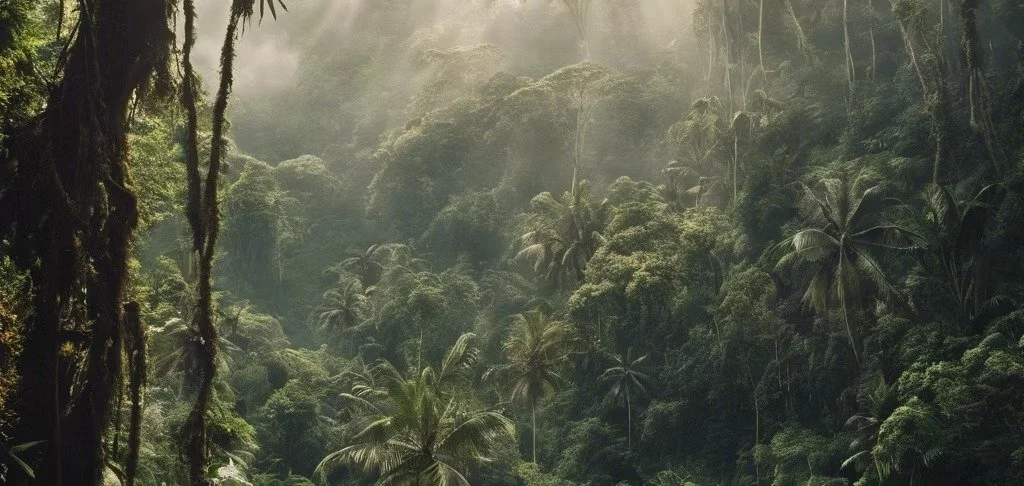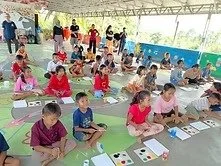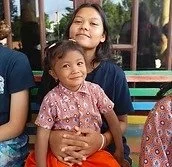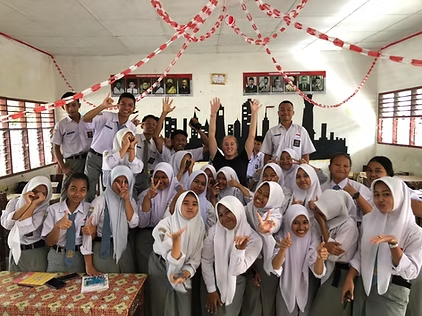
What do we teach? Our Programmes
We currently have six main education programmes at the Trust. Each one serves our overall goal of helping to empower communities through education. Take a look below for more detailed information about the programmes. If you are interested in volunteering there is some information about what is required for each programme.







The Trust's Goals and Aims
Our education programmes empower local people and promote sustainable development.
In our region, unsustainable, environmentally harmful industries are prevalent. Socio-economic development and widespread access to quality education has been fairly low, thus people have relied on the aforementioned industries for survival. For example people living in rural communities have found work with palm oil companies as a way to provide for their families, they have little choice in regards to job opportunities. We know education creates opportunities for people and empowers them with a choice to decide what they do with their lives. We want as many people to have access to free education as possible so that they can find work in sustainable industries which not only don’t harm the environment, but also provide better financial prospects.
We also spread knowledge and awareness about environmental issues affecting our local region. We teach kids about the threats to the rainforest, about conservation efforts and what a good future would look like. We want to create a love and appreciation for the natural environment within the people we work with. We also lead by example by being an environmentally conscious organisation, reducing our plastic usage and recycling. We have an aim to spread knowledge about environmentally friendly farming practices throughout the community and show people how to provide for themselves in a sustainable manner, avoiding environmentally harmful methods. We want to encourage ideas and efforts to find work in sustainable areas, and promote and fund opportunities.
We empower people through education, so that sustainable development can occur and so that the local environment can be protected.
-
For over 13 years now, we have had TK in our building and provided free education for children under 6 years old around Bukit Lawang. The TK curriculum emphasises providing educational stimulation to help physical and spiritual growth and development so that children are ready to enter further education.
The kindergarten curriculum we teach includes reading, writing, and art as well as general knowledge, mathematics, Indonesian & English language, and conservation classes. Materials are presented in interesting and enjoyable ways, such as handicrafts, games, and singing.
The kindergarten curriculum we teach includes reading, writing, and art as well as general knowledge, mathematics, Indonesian & English language, and conservation classes. Materials are presented in interesting and enjoyable ways, such as handicrafts, games, and singing.
However, most importantly of all, is to ensure that the learning process of children in TK takes place in a fun and supportive manner.
We hope that by the end of their year with us, the students are not only academically ready to enter school, but have also had the opportunity to explore their emotional, social, linguistic and artistic potentials.
Volunteer Placement:
In addition to your work as a teacher support at TK, you will also have the opportunity to participate in various traditional workshops including organic soap making, bamboo weaving, tree planting, ecological brick making, and traditional Indonesian cooking classes!




-
The EFL programme is our longest running programme and we teach all age groups and skill levels: Pre-school, Kindergarten (TK), Elementary School (SD), Middle/High School (SMP/SMA) and Adults.
As a volunteer in the EFL program, you will receive comprehensive training at the beginning of your placement and ongoing support from our staff! Moving forward, we aim to open more classes and expand the reach of our program. We are happy to hear all your creative ideas for lessons as well, as long as they fit within the framework of our curriculum!
Alongside your work as an EFL teacher, you will also have the opportunity to participate in a range of traditional workshops including organic soap making, bamboo weaving, tree planting, Eco brick making and traditional Indonesian cooking classes!
Volunteer Placement:
For this placement, we are seeking foreign volunteers who are fluent in English. You don't necessarily need to have an educational background as a teacher or prior teaching experience - as long as you have the willingness to make an impact and contribute to the community in a meaningful way. Since the majority of our programs for now are catered towards children, a general interest in working with kids is an asset.




-
CRE is our newest program launching in January 2026. This program aims to provide workshops tailored to the specific educational needs of the communities in and around Bukit Lawang. We spend half of each cycle listening to our communities and developing a workshop and half the cycle delivering it. Topics include:
Job-specific English training workshops (for teachers, artists, customer service workers, etc.)
Social Emotional Learning (SEL) workshops (for behavior management, confidence, etc.)
Literacy workshops for children, teens, and adults (basic writing, reading, and spelling can include reading challenge workshops)
Numeracy workshops for children, teens, and adults (basic math with a focus on using math for basic financial management)
Anti-pollution and nature appreciation (e.g., meditations, litter picks)
Volunteer Placement:
For this placement, we are seeking Indonesian volunteers or individuals fluent in Indonesian. While not required, our preference is for individuals who have some work experience. This role is great for those who want to develop their strategic thinking and administrative skills.

-
The Youth Ranger program is one of our flagship programs. Teaching children about the importance of environmental care from an early age helps them understand the value of nature and ecosystems around them.
Up to this point, the program has been conducted both at the Trust and in 6 surrounding communities/areas: Batu Rongring, Pohon Rindang, Bukit Lawang, Kendit, Landbau, and Bohorok. The material is delivered interactively and engagingly, through games and direct field practices. For example, engaging in drama, trekking in the forest, and picking up litter around the village. Moving forward, we aim to continue developing the environmental consciousness of the children we are working with. Our hope is that while all of them will know how not to harm the nature they live in, there will also be many who will get inspired to bring positive change to their communities and actively preserve their environments.
Volunteer Placement:
Conservation is important and is one of our main focuses. As a volunteer in this program, you will help teach conservation to children so that they grow up to be environmentally conscious and actively participate in preserving the forest.
This program is open to both Indonesian and international volunteers. You don't have to have a background in environmental education, as long as you have an interest in environmental issues and children. As a volunteer, you will lead conservation classes for children. Let's join and be part of the movement for change for future generations!
Alongside your work as a Youth Ranger Volunteer, you will also have the opportunity to participate in a range of traditional workshops including organic soap making, bamboo weaving, tree planting, Eco brick making and traditional Indonesian cooking classes!




-
The SBP is a ten week business fundamentals course which encourages individuals to create or adapt an existing business idea so that it meets certain sustainability criteria. We offer grants to successful participants on the course to invest in their businesses, making an immediate and deeply felt impact in our local communities.
Currently, over 40 local entrepreneurs have received guidance and funding from us to develop their businesses, including chicken farming, warungs (local cafes), herbal medicines, traditional clothing and more! In the future, we plan to run new courses but we continue to visit our past participants as well and create networking groups, or run one off sessions on topics that they want assistance on. We are constantly trying to develop our curriculum so that it is as useful as possible for our students.
Our Sustainable Business programme is funded in partnership with Jersey Overseas Aid, Jersey’s official, publicly-funded aid and development agency. JOA’s mission is to translate the generosity, skills and compassion of the people of Jersey into effective assistance for the world’s most vulnerable people.
Volunteer Placement:
As a volunteer, you have the opportunity to become a facilitator to help local entrepreneurs become more financially empowered by teaching skills to start and develop businesses sustainably. Only volunteers who speak Indonesian can work on the SBP because the material is delivered in Indonesian.





-
Our problem today is not one of producing more food, but producing food where it is most needed and, in a way, that respects nature. Through Ecological farming we ensure healthy farming and healthy food for today and tomorrow, by protecting soil, water and climate.
Through this program we want to educate people about the benefits of eco farming compared with conventional agriculture. Organic farming offers numerous benefits that contribute to a healthier lifestyle and environment and also has economic advantages. We grow a variety of fruits, vegetables and flowers at the farm, all of which are constantly changing and in rotation.
We run kids' farming classes every week to teach them about basic farming skills, including planting and harvesting. Our aim is to get them excited about growing their own food and with classes on cooking, preserving food and creative elements thrown in too, the classes are kept fun and engaging.
The project aims to spread knowledge about eco farming throughout the community. There are many people with land to grow food and we want to show people it can be done in a sustainable manner. In the long run, we would also like to work with PPLH to encourage urban farming within the village for those people without much land.
Volunteer Placement:
During the course of your placement you will be directly contributing towards the maintenance of the local ecosystem by looking after this rare and impactful Eco Farm. You will be supporting the team at PPLH Bohorok, maintaining and running a fully operational eco-friendly farm, as well as helping to manage farming classes for kids. Our Eco Farming program is designed and run by our Indonesian team and is a perfect escape from the busy modern lifestyle in the west whilst still making a considerable positive impact to the natural environment.
Alongside your work as an Eco farmer, you will also have the opportunity to participate in a range of traditional workshops including organic soap making, bamboo weaving, tree planting, Eco brick making and traditional Indonesian cooking classes!




-
The United Nations Sustainable Development Goals (UN SDGs) are a collection of 17 interlinked global goals designed to achieve a better and more sustainable future for all. These goals were adopted by all United Nations Member States in 2015 as part of the 2030 Agenda for Sustainable Development. The SDGs are intended to be achieved by the year 2030. Here is a brief overview of each goal:
No Poverty: End poverty in all its forms everywhere.
Zero Hunger: End hunger, achieve food security and improved nutrition, and promote sustainable agriculture.
Good Health and Well-being: Ensure healthy lives and promote well-being for all at all ages.
Quality Education: Ensure inclusive and equitable quality education and promote lifelong learning opportunities for all.
Gender Equality: Achieve gender equality and empower all women and girls.
Clean Water and Sanitation: Ensure availability and sustainable management of water and sanitation for all.
Affordable and Clean Energy: Ensure access to affordable, reliable, sustainable, and modern energy for all.
Decent Work and Economic Growth: Promote sustained, inclusive, and sustainable economic growth, full and productive employment, and decent work for all.
Industry, Innovation, and Infrastructure: Build resilient infrastructure, promote inclusive and sustainable industrialization, and foster innovation.
Reduced Inequality: Reduce inequality within and among countries.
Sustainable Cities and Communities: Make cities and human settlements inclusive, safe, resilient, and sustainable.
Responsible Consumption and Production: Ensure sustainable consumption and production patterns.
Climate Action: Take urgent action to combat climate change and its impacts.
Life Below Water: Conserve and sustainably use the oceans, seas, and marine resources for sustainable development.
Life on Land: Protect, restore, and promote sustainable use of terrestrial ecosystems, manage forests sustainably, combat desertification, and halt and reverse land degradation and halt biodiversity loss.
Peace, Justice, and Strong Institutions: Promote peaceful and inclusive societies for sustainable development, provide access to justice for all, and build effective, accountable, and inclusive institutions at all levels.
Partnerships for the Goals: Strengthen the means of implementation and revitalize the global partnership for sustainable development.
These goals address global challenges such as poverty, inequality, climate change, environmental degradation, peace, and justice. They are designed to be a blueprint to achieve a better and more sustainable future for all.
For more detailed information, you can visit the United Nations Sustainable Development Goals website.


